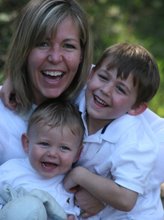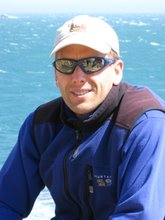Pete and I were married by a good friend of ours, Father Amador Garza. He was actually a friend of Pete's first -- Pete met him through the family he was living with while attending graduate school (Jeanine and Sandy McNally). Jeanine and Amador are childhood friends and Amador visited frequently while Pete lived there.
We have been married almost 10 years and have stayed close with Amador this whole time. He always remembers to call us on our anniversary; we exchange emails to share updates in our lives; and I have called him a handful of times in the past to get his advice on how to navigate through some of life's bigger challenges. For instance, during my pregnancy with Kyle I was actually pregnant initially with triplets. The thought of having triplets was completely overwhelming to Pete and I not only for the obvious reason (e.g., how exactly do two people take care of three newborns at the same time while also having a 4-year-old to care for?) but also because the risks that accompany triplet pregnancies are enormous. There is a 40+% chance that one or more of the babies will end up with a disability (and given the fact that Pete and I were told while we were undergoing IVF that we only had a 20% chance of ending up pregnant with triplets, forty percent seemed pretty damn daunting!); with triple pregnancies, there is a very high likelihood that the whole pregnancy will terminate prematurely; and 0% of triplet pregnancies make it to full term, which leads to a whole host of possible complications. Given these statistics, a couple of our doctors were actually recommending that we do what's called "selective reduction", whereby they would selectively abort one of the babies in the hopes of increasing the odds for the other two. As if the thought of this procedure were not emotionally heart-wrenching enough, there is a 20% chance of losing all three babies during this procedure, which obviously needs to be factored into the decision. Needless to say, Pete and I were at a complete loss as to what to do. The thought of selective reduction was horrifying to me! I could not fathom actually aborting one of my own babies. And yet, I was also terrified that if I didn't, we would lose the entire pregnancy as the doctors were predicting. And so I called Amador; I wanted to know his thoughts on how to weigh these two incredibly difficult options. His answer was simple: "Leave it to God." He told me to rejoice in the fact that I was pregnant with three babies and not to be scared. He told me that God would handle everything. And in the end, that is exactly what happened: Before we were forced to decide what to do, we ended up losing two of the babies naturally and Kyle miraculously survived. I will never forget Amador's advice, however. While I was looking for someone to help me make sense of our "shades-of-gray" medical options, he was able to focus my attention instead on the fact that there are some things in life which we cannot -- or more appropriately, should not -- try to control.
Anyway, all of this is a long-winded way of leading up to the point that Amador called me today to check in. He has been reading my blog and wanted to see how I was doing on my first day back in treatment. Ironically, he called right at the moment when I was posting my blog entry below (about how I had a hard day and about how my parents and Pete were struggling to help me feel better) and so I talked with him about the things that I had written. As always, Amador shared with me some very sage advice. He told me that when he first joined the priesthood, members of his parish who were struggling with depression would come to him seeking help. Amador is, by nature, not a depressed person. In fact, he is quite the opposite: always happy and joking around, always able to keep life in perspective and stay optimistic. He admitted, therefore, that he had a hard time at first relating to these parishioner's struggles and an even harder timing knowing what to do to help them. Over time, however, he told me that he began to realize that it was not up to him to help them feel better or to "fix" them -- they needed to find happiness within themselves. All that he could really do was to "journey with them," and to be there to lend a listening ear when they need it. And so this is what he now tells people who come to him for help.
The more that I thought about this advice, the more I realized that it is true for me as well. As much as Pete or my parents or other friends and family want to help me to feel better, I need to heal myself. As I have said from the beginning, this is my mountain to climb. It's not a fun or an easy mountain, and as much as I would love to "pass the baton" to someone else at this point so that they can take over for awhile, unfortunately, no one else can make the climb for me. What everyone else can do, though, is to stay at the top of the mountain and continue to yell encouragement down to me; to remind me that I am strong and that I can do this. And they can keep Luke and Kyle happy and healthy so that I don't have to waste any energy worrying about them. And they can lower my children down to me as I climb so that I can see them and laugh with them and kiss them and know that they are safe. And they can make sure that my ropes are strong so that they don't break and send me crashing to the bottom. In an nutshell, everyone who loves me can "journey with me", but ultimately, it's up to me to heal myself and to find my own happiness.
Monday, July 9, 2007
Subscribe to:
Post Comments (Atom)



No comments:
Post a Comment